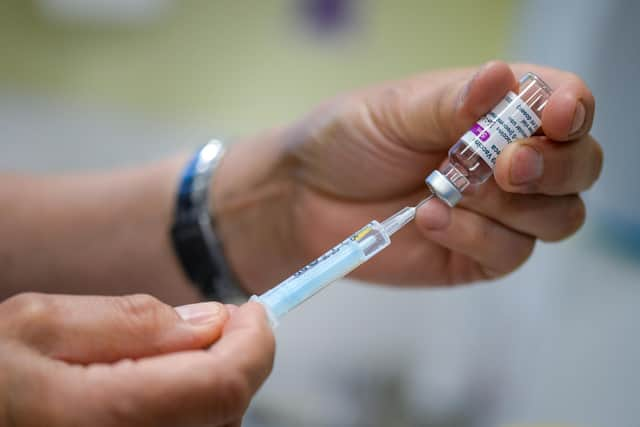Single AstraZeneca vaccine dose prevents 70% of Covid cases - and protects against coronavirus variants
and live on Freeview channel 276
A single dose of the AstraZeneca Covid-19 vaccine is highly effective in protecting against the virus, preventing seven out of 10 cases.
New research from a Canadian study shows that the first dose alone provides 88 per cent protection against hospital admissions, while preventing an estimated 70 per cent of infections.
Advertisement
Hide AdAdvertisement
Hide AdThe study compared vaccination rates in 70,000 people who tested positive for Covid-19 in Canada between December and May.


We want to hear from you: let us know what you think about this story and be part of the debate in our comments section below
At a glance: 5 key points
- A single dose of the AstraZeneca Covid-19 vaccine, Vaxzevria, will prevent nine out of 10 hospitalisations and seven out of 10 cases, a study has found.
- Sage experts previously warned that the AstraZeneca vaccine, which has been given to around half of Brits, may only give 40 per cent protection against the virus.
Advertisement
Hide AdAdvertisement
Hide Ad- Findings from a study carried out by the Canadian Immunization Research Network in Canada nearly doubles this estimate to 70 per cent, suggesting only three out of 10 people who have received one dose will fall ill with Covid-19.
- The research comes after ministers reduced the gap between doses from 12 to eight weeks amid fears a single dose would not provide enough protection against the highly contagious Delta Covid variant.
- The vaccine was also found to be highly effective in protecting against Covid-19 variants, offering 70 per cent and 72 per cent protection against the Delta and Alpha variants, respectively.
What’s been said
While the vaccine has been shown to be effective in protecting against infection and hospitalisation after just one dose, scientists still say it is vital people return for their second dose to ensure the highest level of protection against the virus.
Advertisement
Hide AdAdvertisement
Hide AdSir Mene Pangalos, executive vice president at BioPharmaceuticals R&D, said: “With different variants threatening to disrupt our route out of the pandemic, this real-world evidence shows that Vaxzevria, along with other vaccines used in Canada, provides a high level of protection against the most serious forms of the disease, even after just one shot.
“It is essential that we continue to protect as many people as possible in all corners of the world in order to get ahead of this deadly virus.”
Background
A recent study funded by the Department of Health and Social Care (DHSC) found that an eight week gap between vaccine doses is a “sweet spot” in generating a strong immune response, and protecting against the Delta variant.
The Joint Committee on Vaccination and Immunisation (JCVI) initially recommended a 12-week gap between two doses of the Pfizer and AstraZeneca vaccines at the start of the second wave.
Advertisement
Hide AdAdvertisement
Hide AdThis was at a time when vaccines were short in supply and preliminary research suggested that widening the gap from the manufacturer-recommended four weeks to 12 improved immune response.
However, in May the guidance was changed to eight weeks as cases associated with the Delta variant, which was first identified in India, continued to rise in the UK.
Professor Susanna Dunachie, of the University of Oxford, and joint chief investigator in the Pitch study, said: “The original recommendation from JCVI was 12 weeks and this was based on a lot of knowledge from other vaccines that often having a longer interval (between doses) gives your immune system a chance to make the highest response.
“The decision to put it to eight weeks is really balancing all the wider issues, the pros and cons – two doses is better than one overall. Also, other factors need to be balanced, (such as) vaccine supply, the desire to open up, and so on.
Advertisement
Hide AdAdvertisement
Hide Ad“I think that eight weeks is about the sweet spot for me, because people do want to get the two vaccine (doses) and there is a lot of Delta out there right now.
“Unfortunately, I can’t see this virus disappearing so you want to balance that against getting the best protection that you can.”
A message from the editor:
Thank you for reading. NationalWorld is a new national news brand, produced by a team of journalists, editors, video producers and designers who live and work across the UK. Find out more about who’s who in the team, and our editorial values. We want to start a community among our readers, so please follow us on Facebook, Twitter and Instagram, and keep the conversation going.
Comment Guidelines
National World encourages reader discussion on our stories. User feedback, insights and back-and-forth exchanges add a rich layer of context to reporting. Please review our Community Guidelines before commenting.